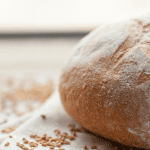
SAYING 20: “The disciples said to Jesus, “Tell us what the Kingdom of Heaven is like?” He replied to them, “It is like a mustard seed, the smallest of all seeds. But when it falls on tilled soil, it produces a great plant and becomes a shelter for birds of the sky.”
In this saying, which is found also in the Canonical Gospels of Matthew 13:31, Mark 4:30 and Luke 13:18, Jesus follows the repeated pattern of making absurd statements, favoring the small over the large, and confounding conventional wisdom to engage the imagination of his disciples.
As you may already know, the mustard seed is not “the smallest of all seeds” as Jesus suggests here. Yes, it is a small seed, and that small seed produces a plant that essentially takes over any space where it is planted – like a weed – but it is hardly the smallest of all.
That title goes not to the mustard seed but to the orchids that grow in tropical rainforests.
According to one Botanist:
“The smallest seeds in the world have no endosperm and contain underdeveloped embryos, are produced by certain epiphytic orchids (family Orchidaceae) in the tropical rainforest. Some seeds are only 1/300th of an inch (85 micrometers) long, which is below the resolving power of the unaided human eye. One seed weighs only 1/35,000,000th of an ounce (0.81 micrograms). Orchid seeds are dispersed into the air like minute dust particles and come to rest in the upper canopy of rainforest trees, where they eventually germinate.
On the other hand, the seed of the begonia plant is about 1/100th of an inch in size, that of the petunia plant about 1/50th of an inch, and that of the mustard plant (family Brassicaceae) about 1/20th of an inch.”
So, are there smaller seeds to be found? Yes. But those smaller seeds are not the sort that grow as quickly as mustard seeds do, nor are they the type of seeds that might overtake a garden.
What Jesus intends to communicate here is that the mustard seed – although quite small – grows rapidly and aggressively into a plant that cannot be contained, controlled or easily eliminated.
In fact, contemporary listeners to this parable would have laughed out loud at the parable, but not because Jesus got the detail about which seed was the smallest of all. They would have laughed because no one in their right mind would ever plant a mustard seed in their garden. To do so would be foolish, unless your plan was to allow everything else in your garden to wither and to commit yourself to growing mustard – and only mustard – as it eventually choked out everything else in your garden.
Mustard, in other words, is an invasive species of plant that does not mix well with other plants. It does not live in a balanced equilibrium with other species. In fact, once planted, it will overtake those plants completely.
And that, my friends, is the point.
The Kingdom of Heaven has been planted within our hearts and it will eventually, and inevitably, flourish and spread until everything else becomes engulfed in its shade.
No, mustard plants do not grow to become massive trees that beckon the birds of the sky to build their nests on its branches. Hardly.
In fact, mustard plants do not grow as tall as trees, and no birds build nests in them. But, in this metaphor, Jesus suggests that the Kingdom of God will overtake every other plant in the garden of our hearts – like a mustard plant overtakes other plants – until no other plants are available for the birds to build their nests in.
This is hyperbole. It’s not intended to make agricultural sense. It is intended to provoke our imaginations.
By comparing the small origins of a mustard plant to the humble beginnings of the Kingdom, Jesus is saying that what seems to start out tiny will soon spread across the land.
By comparing the fast-growing nature of the mustard plant to the spread of God’s Kingdom, Jesus is suggesting that it cannot be stopped and it will not fail to grow and thrive.
But notice, also, that Jesus emphasizes the need for this small mustard seed to fall on “tilled soil” in order to take root and blossom. This suggests that not everyone will receive the message of the Kingdom. Our hearts require softening, our minds must become open. We have to first accept the command to “Metanoia” – think differently – about reality before we can become fertile ground for God’s Kingdom to sprout.
We should also make it clear that when Jesus speaks about “The Kingdom of Heaven”, he is not speaking about where anyone’s spirit goes after they die. This is a code for the reality of God’s presence in there here and now; a Kingdom that Jesus says is “within us” – each of us – whether we realize it or not.
It’s also important to note that the “birds of the sky” reference points back to Ezekiel 17:22-23 which speaks about God planting a cedar tree atop a large mountain where “birds of every kind will nest in it [and] find shelter in the shade of its branches.” But Jesus intentionally switches the metaphor from the “mighty cedar” to the tiny mustard seed. Why? Because he wants us to understand that God’s Kingdom isn’t necessarily the largest or the most powerful of all plants; that it’s actually symbolized more in the tiny seed that subversively grows where you least expect it to, and to perform in ways you didn’t anticipate.
Again, the necessity of “thinking again” is underscored for us in this parable. Things are not what they seem, and reality is more surprising than we think.
To me, the reference to the “birds of the sky” taking shelter within this Kingdom of Heaven is intended to teach us that there is room for those who are not like us; that the Kingdom exists for the benefit of others and not only for ourselves.
The mustard seed grows in the earth and spreads across the ground, but it makes room for those who dwell in the sky and welcomes those who may find the earth a foreign place to call home.
THIS SATURDAY – LIVE ZOOM
UPDATED TIME – 1PM MOUNTAIN TIME THIS SATURDAY
If you’re reading this, you’re invited to a live, private and exclusive member’s only INNER CIRCLE Zoom call this Saturday, Sept. 10th, at 1pm MT.
To receive the link to join our call where we will discuss The Gospel of Thomas, non-duality, Oneness, etc. for one hour, please RSVP via email to me at: Keith@Quoir.com
Once I receive your email I will send you the link to join the live Zoom call for Saturday, 9/10/22 at 1pm MT.
See you there!
**
Keith Giles is the author of the hot new bestseller, SOLA MYSTERIUM: Celebrating the Beautiful Uncertainty of Everything, available now on Amazon. Keith is also the host of Second Cup with Keith, a new solo podcast available now on the Ethos Radio App, for Apple and Android and on Spotify. Keith is also co-host of the long-running HERETIC HAPPY HOUR PODCAST.

















